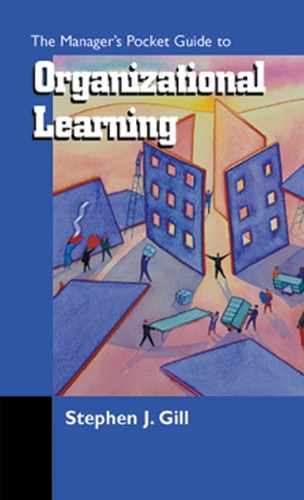![]()
I have painted the landscape of organizational learning for you. Your next step is to focus on the details: to learn more about those aspects of organizational learning that will prove most immediately helpful in your work.
Organizational learning is acquiring and applying knowledge at the individual, small-group, and whole-organization levels in order to build the capacity of the organization to achieve its strategic goals. Organizational learning is not simply a catalog of training programs, although training is a very important aspect of learning. Opportunities for learning and change are enormous in any complex organization, and they will become more obvious to you when you adopt a mental model of work as learning—when you accept the notion that you are in the business of organizational learning.
The keys to effective organizational learning? Reflection and feedback. These are what allow individuals and groups to learn from information. We are bombarded by information throughout the workday. Valuable learning occurs when we can take in this information, reflect on its meaning and value, use it in our work, and receive feedback from others regarding its effects. Your job is to create conditions in which reflection and feedback become part of the normal work processes of your organization.
I hope this short book has provided you with concepts, approaches, and even a few tools to help you help your organization learn. You no doubt realize that some of the strategies I have described can be implemented on your own, whereas others will require assistance from experts. Remember: A good manager knows when (and where) to get help.
You have a critical role to play in organizational learning. As a manager, you can create the conditions that motivate, support, and enhance everyone’s learning. Get started by filling out the self-audit below.
